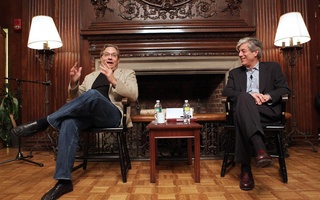Last Monday, Peter A. Thiel visited Harvard’s Institute of Politics. Thiel, the former chief executive officer of PayPal and a well-known venture capitalist and entrepreneur, spoke on a number of topics to interested students and other members of the audience. Among others, he promoted his internationally renowned Thiel Fellowship, a scholarship that grants twenty students $100,000 to leave higher education and pursue individual start-up innovation projects for two years. Indeed, last year, two Harvard students left to pursue projects with the prestigious grant, awarded to the “20 under 20” bright young people selected through a rigorous application process.
While the decision to leave college is a personal one, people like Thiel should not encourage students to forsake higher education for the sake of a shot at entrepreneurship mid-way through their undergraduate careers.
Of course, Harvard boasts multiple successful and well-known dropouts. For example, Mark Zuckerberg recently made national headlines when his company Facebook filed for an initial public offering, announcing its intention to go public in the near future. However, Facebook is the exception, not the rule, among start-up companies. Harvard students with dreams of starting tech companies that will be “the next Facebook” should understand that their chances of making it big are negligibly small.
The decision to leave Harvard temporarily or for good is, above all, a personal decision. Indeed, there are many reasons why a student might want to take time off from Harvard, including those stemming from mental health and financial issues. These are important and worthwhile justifications for taking time off—in fact, students should be encouraged to spend a semester or two away from campus if they need to alleviate stress. However, leaving school for personal reasons is different from leaving school to pursue an alternate career, like a start-up company.
Happily, Harvard allows students to take an indefinite amount of time off and still return to complete their undergraduate degree. This is essential. It is important that students are still able to return once they have taken time off to pursue a start-up. Nonetheless, Harvard students should recognize the risks of a decision to take time off and make the choice to leave only after serious consideration.
After all, college is a truly exceptional and important life experience, and a good investment of four years of one’s time. Peter Thiel, however, repeatedly denigrates the value of college. He has spoken out against the “higher education bubble,” suggesting that students go into debt and waste years of their lives in college simply “because that’s what everybody’s doing.” He has noted in interviews that “70 to 80 percent of the colleges in the U.S. are not generating a positive return on investment.” As students in the midst of the higher education experience, we believe that a liberal arts institution like Harvard is hardly a waste of time—on the contrary, students who have the ability and enthusiasm to attend college should not be discouraged from doing so by prominent public figures.
Meanwhile, we should question Thiel’s own motivations in speaking out against college. As an entrepreneur and venture capitalist with a vested interest in recruiting top talent, his advocacy against higher education and his establishment of the Thiel Fellowship are clearly both motivated in part by self-interest; indeed, they allow him both to mentor multiple intelligent and motivated young people and attract more attention to his controversial libertarian activism.
With this in mind, Thiel should not encourage students to drop out in the pursuit of marketable startup ideas, and students should think very hard before leaving to follow him.
Read more in Opinion
AHIP Hooray!Recommended Articles
-
 Bringing All the Stars to the Yard
Bringing All the Stars to the Yard -
Four Win Gates ScholarshipThree Harvard undergraduates and a Harvard Medical School student are among the 30 American recipients of the Gates Cambridge Scholarship.
-
TED Curator Speaks at GSD Class DaySpeaking in front of a packed audience in Piper Auditorium at the Harvard Graduate School of Design’s Class Day, Technology Entertainment and Design (TED) Curator Chris Anderson encouraged the graduating class to pursue knowledge and to never stop learning.
-
Cambridge City Council Candidate: Leland CheungIf reelected for a second term on the Cambridge City Council, Leland Cheung says he will be an advocate for government transparency.
-
LinkedIn Founder Talks to IOPReid Hoffman, co-founder of business networking website LinkedIn, spoke about networking and entrepreneurship on Wednesday at the Institute of Politics’ JFK Jr. Forum.













